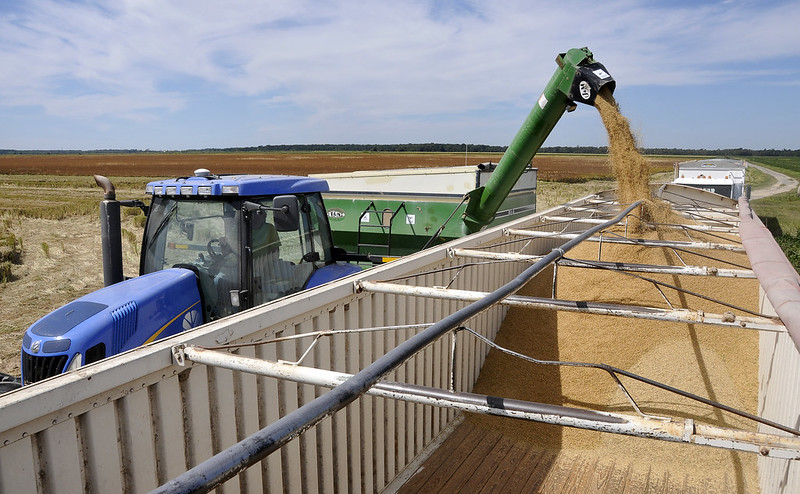Rain at harvest a minor inconvenience for rice, but milling quality still the chief concern
Oct. 3, 2025
By Ryan McGeeney
U of A System Division of Agriculture
Fast Facts:
- Late-September rains unlikely to impact harvest
- Mid-season milling yields better than 2024, but still low
- 2026 rice acreage likely to shrink
(401 words)
(Newsrooms: Download file art)
LITTLE ROCK — While late September rain may have set Arkansas’ rice harvest back a couple of days, it didn’t wash away the concerns farmers have for the milling quality of their grain.
“Rains at this point are just a minor slowdown,” said Jarrod Hardke, extension rice agronomist for the Division of Agriculture. “For most farmers, it’s just going to mean two or three days out of the field. We’ve been relatively dry here for a while, so we’re able to handle a little bit more rain.”
Vast portions of Arkansas received between 1 and 2 inches of rainfall during the final week of September, with some isolated areas receiving more. El Dorado, Arkansas, for example, received a record 4.71 inches on Sept. 24. However, with 79 percent of the state’s rice acreage harvested as of Sept. 28, according to the U.S. Department of Agriculture, a few days’ delay won’t hurt anything, Hardke said.
Growers were fortunate in that the late-September storms did not bring high winds with them, Hardke said.
“Our biggest fear this time of year is high winds, which can lead to lodging,” he said.
Still facing milling woes
Despite a fast-paced harvest season, Arkansas rice growers are still reporting problematic milling yields, the same thing that cut into 2024 profits. While growers report better milling yields this year, Hardke said they’re still falling short of the industry standard, with whole kernel yields coming in at about 52 percent.
“The industry standard for milling yield is 55/70, which means that of the rice we grow in the field, 55 percent of that grain is milled to a whole grain, and 70 percent of the overall yield can be milled to a combination of whole grains and broken grains,” Hardke said. In 2024, the unofficial state milling yield average was estimated at 48/69.
Like most commodities, rice production is being squeezed by global economic forces.
“We’re importing record amounts of rice into the country and not exporting the volume of rice we typically do,” Hardke said. “The global dynamics are at odds with the U.S. rice industry right now.”
Fewer rice acres in 2026
Hardke said that everything points to a reduction in U.S. rice acreage in 2026. Most growers, he said, already employ a two- or three-way rotation of rice, soybeans and corn, so many growers will likely shift a substantial amount of acreage toward the latter two grains.
To learn about extension programs in Arkansas, contact your local Cooperative Extension Service agent or visit www.uaex.uada.edu. Follow us on X and Instagram at @AR_Extension. To learn more about Division of Agriculture research, visit the Arkansas Agricultural Experiment Station website: https://aaes.uada.edu/. Follow on X at @ArkAgResearch. To learn more about the Division of Agriculture, visit https://uada.edu/. Follow us on X at @AgInArk.
About the Division of Agriculture
The University of Arkansas System Division of Agriculture’s mission is to strengthen agriculture, communities, and families by connecting trusted research to the adoption of best practices. Through the Agricultural Experiment Station and the Cooperative Extension Service, the Division of Agriculture conducts research and extension work within the nation’s historic land grant education system.
The Division of Agriculture is one of 20 entities within the University of Arkansas
System. It has offices in all 75 counties in Arkansas and faculty on three campuses.
Pursuant to 7 CFR § 15.3, the University of Arkansas System Division of Agriculture offers all its Extension and Research programs and services (including employment) without regard to race, color, sex, national origin, religion, age, disability, marital or veteran status, genetic information, sexual preference, pregnancy or any other legally protected status, and is an equal opportunity institution.
# # #
Media Contact:
Ryan McGeeney
rmcgeeney@uada.edu
501-671-2120
